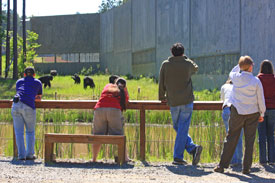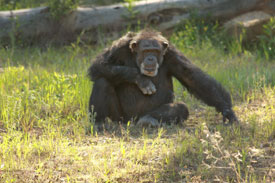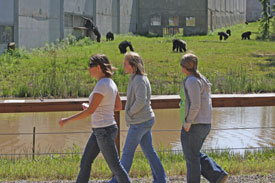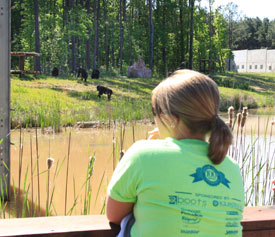(May 1, 2008)
Contact: Rick DelaHaya, Centenary News Services, 318.869.5073
Centenary Students Observe Behavior in the "Wild"

Students observe chimpanzees at Chimp Haven as part of their Animal Behavior class at Centenary College. The 27 juniors and seniors were learning about the computer-based program The Observer and how it is used in "field conditions."
—Photo by Sherry Heflin
SHREVEPORT, La.—Tucked away in the pine forest of northwest Louisiana, 140 residents have made their way to a retirement home built especially for them. With names such as Grandma, Grandpa, Teresa, Puddin and Mason, they have been retired by the federal government after devoting a lifetime to science and medical research. Most have been born in laboratories and never had the opportunity to experience life in the wild...until now.
For the chimpanzees that have made it to Chimp Haven, it is their opportunity to reconnect with their African roots and experience life outside the laboratories. Since many of them have not been in large social groups or even something as basic as setting foot on the grass, primatologists and behaviorists at the 200-acre sanctuary were curious how the chimps would adapt to life outside of cages. One way to ensure that they are receiving the care they need is through close observations of their daily routines and interactions with one another.

Puddin', a 29-year old male chimpanzee, watches members of Dr. Beth Leuck's Animal Behavior class while they were observing the chimpanzees during a visit to Chimp Haven recently.
—Photo by Sherry Heflin
Centenary students from Dr. Beth Leuck's Animal Behavior class were given a rare inside look at how this is accomplished when they visited Chimp Haven April 15. During their short visit they were given the chance to observe chimpanzee behavior under unique semi-natural conditions, and have the opportunity to see how the staff uses a computer program that the students have learned to use in the class called The Observer.
"This was the perfect opportunity for the students to actually see and put into use what they have learned in the classroom," said Dr. Leuck. "The students learned that the version of The Observer they had learned to use was the "baby version" compared to the one the staff at Chimp Haven has. Because they have learned to watch animals throughout the semester, they appreciated the difficulty of watching a large group of animals that interacts rapidly and often, and they were very impressed that Chimp Haven's behaviorist Amy Fultz could remember and
type all those two-letter codes into The Observer as fast as she could."

While visiting the sanctuary, the class listened to a presentation by Fultz about the history and mission of Chimp Haven and about the type of data she collects on the chimpanzees. She then handed out a chimpanzee ethogram, which is a list of all behaviors an animal performs, to the juniors and seniors in attendance. The ethogram contained more than 200 behaviors and their corresponding codes used in the computer-based observation program.
"One of the most interesting things was when she talked about how she and her staff use The Observer to understand in an objective way how the chimpanzees interact and who spends time with whom, and how the chimpanzees use their environment," added Dr. Leuck. "Amy pulled up the actual program on her laptop and let the class members see how it worked." After the presentation the class spent almost 45 minutes observing the chimpanzees in the outdoor areas.

The chimpanzees starting arriving at the sanctuary April 2005 and one of the biggest concerns was how and if they would actually use the spaces provided for them, especially the five-acre natural habitats. The staff was curious to see if the wild-born chimpanzees would recall their African roots and remember something as basic as how to climb a tree, or how to "fish" for termites. There was even concern about creating large social groups since most of the chimpanzees came from laboratories where they were in smaller groups.
"We use the Observer program everyday here at the sanctuary and it helps us collect data on the chimpanzee's adaptation to their new environment at Chimp Haven and to observe the development of Tracy, an infant chimpanzee born at the facility," said Fultz. "I think it's great that the Centenary students are getting experience with The Observer software program and are being encouraged to go out and actually observe animals in the field. It's a learning experience that is very different from watching animals in a laboratory setting. Dr. Leuck is providing the students with real world skills and knowledge that will benefit them as they move forward in their careers."
About Centenary College of Louisiana
Centenary College is a private, four-year arts and sciences college affiliated with the United Methodist Church. Founded in 1825, it is the oldest chartered liberal arts college west of the Mississippi River and is accredited by the Southern Association of Colleges and Schools. Centenary is one of 16 colleges and universities constituting the Associated Colleges of the South and is regularly rated as one of the top colleges in the South. In 2008 Centenary College celebrates 100 years in Shreveport and Bossier City.
